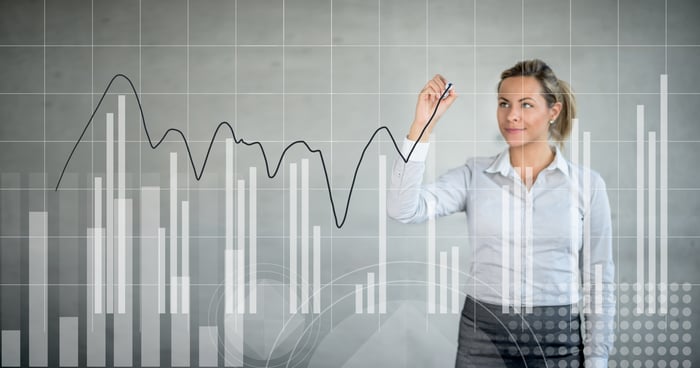The best way to execute a long-term investment strategy is to dollar-cost average (DCA) into an asset. Bitcoin (BTC 0.76%) is no exception.
For most people, buying a little bit each day, or every week, will result in higher returns than if they tried to time the market. By buying every day, you're getting the best prices, the worst prices, and everything in between. Implementing a DCA strategy for Bitcoin serves three purposes: to get the best average price on Bitcoin, to save time, and to alleviate the fear of missing out.

Image source: Getty Images.
The best average price
If someone were to buy $10 worth of Bitcoin every day for the past four years straight, they'd have spent $14,610. According to dcaBitcoin.com, those dollars would have bought about $61,000 worth of Bitcoin. Now someone could have bought the March 2020 crash, or the April 2021 dip, and come out with bigger gains. However, few traders have the foresight to predict such market events and the skills to execute on the trades. By dollar-cost averaging, you're letting statistics be your professional trader. By getting the best average price, you're releasing yourself from needing to read and learn about trading. In short, you're saving yourself a lot of time.
Let traders trade
If you're not a trader, then you probably shouldn't be trading. This is a lesson I learned from Morgan Housel's book, The Psychology of Money. Within it, he explains that people who aren't traders will end up losing time and money by trying to trade. This is the exact opposite of the outcome that someone who is investing wants to achieve. But it's possible to derail this outcome with just a few bad trades. The better option is to put your trades on autopilot and focus on your career and life. I've recognized that I am not a great trader and that is because I let my emotions get the better of me. One emotion specifically has given me quite a bit of trouble: the fear of missing out.
The fear of missing out
For me, the fear of missing out is rooted in greed. I see prices climbing and I don't want to be left behind. Conversely, I see prices falling, and I see an abundance of good deals that I wish to capitalize on. My problem is that I have a tendency to go all in. So when I go all in on the dip, the dip tends to keep dipping. This leaves me without any liquid cash to buy the dip's dip.
Rather than trying to change my emotions, I've decided to negotiate with my psyche. I buy $10 worth of Bitcoin every day, so my mind is pleased that I've gone to bed with more Bitcoin than I woke up with. From a budgeting perspective, I know that I need at least $300 in my exchange account at the start of the month. This also stops me from going all in because I know I'm getting the best average price. Because I don't go all in, I have a bit more cash on hand for when those dips come. My strategy has been to not change my psyche but to use my fear of missing out to my advantage by adopting the strategy that works best with it.
A forward-thinking approach
The DCA strategy works well in conjunction with a forward-thinking approach. The longer the time horizon, the better this strategy will work. As long as the general direction of Bitcoin is up, time will take care of smoothing out the short-term losses. I'm not worried about the 40% drops in Bitcoin because this is ultimately an opportunity to get a better price. I can let my bot that automatically buys Bitcoin every day do all the work, while I get to enjoy my free time and make headway in my career stress-free.







